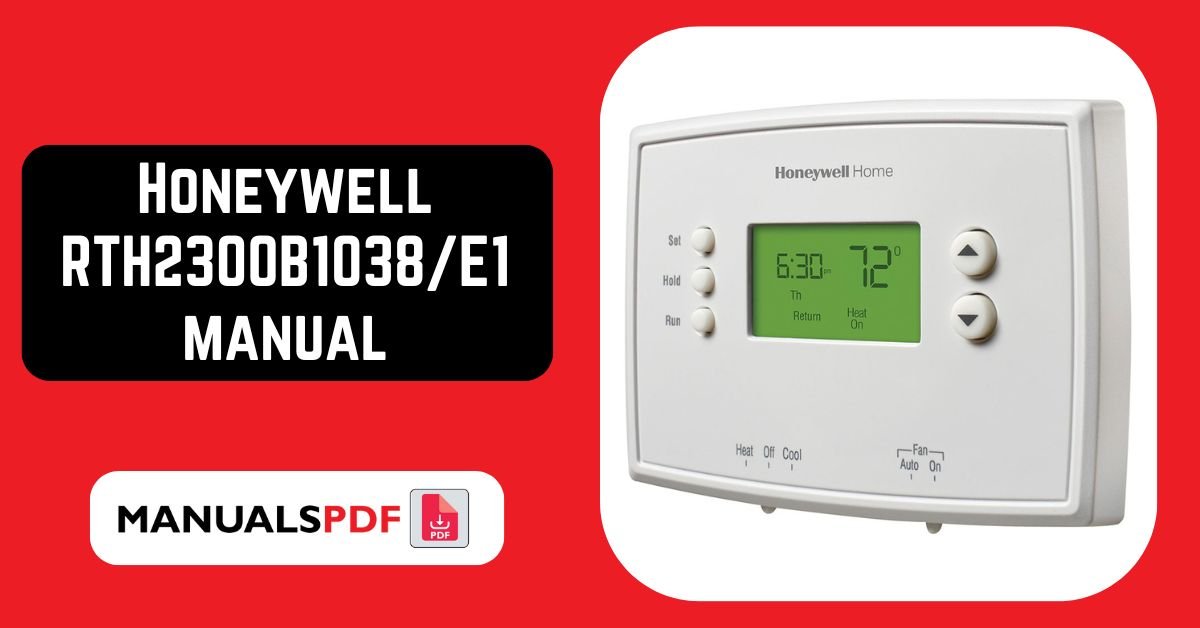The Honeywell RTH2300B1038/E1 is designed for users seeking a simple, cost-effective solution for managing home temperatures. It offers basic programmable functionality with easy-to-use controls, making it suitable for those who need reliable temperature management without complex features.
The complete manual for Honeywell RTH2300B1038/E1 is displayed below.
Table of Contents
Honeywell RTH2300B1038/E1 Manual PDF
Honeywell RTH2300B1038/E1 Specification
Display:
- Type: LCD display
- Size: Approximately 2.5 inches diagonal
Compatibility:
- HVAC Systems: Compatible with most 24V heating and cooling systems, including single-stage heating and cooling systems and heat pumps without auxiliary heat.
- Power Supply: Powered by 24V from the HVAC system; no C-wire is required for basic operation.
Power Supply:
- Power Source: Operates on 24V power supplied by the HVAC system; includes a battery backup for settings retention.
Programming:
- Type: 5-1-1 Day Programming
- Settings: Allows separate schedules for weekdays and weekends, with up to 4 temperature settings per day.
Product Features
5-1-1 Day Programming:
- Custom Schedules: Offers different schedules for weekdays and weekends, with up to 4 temperature settings per day (morning, day, evening, and night).
Simple Interface:
- User-Friendly Controls: Features a straightforward LCD display and buttons for easy navigation and programming.
Temperature Control:
- Precise Control: Provides accurate temperature management to maintain comfort.
Battery Backup:
- Settings Retention: Includes batteries to keep settings stored in case of power outages.
Filter Change Reminder:
- Maintenance Alerts: Reminds you when it’s time to check or replace the air filter.
Temperature Range:
- Comfort Range: Typically covers a wide temperature range suitable for most home heating and cooling systems.
Energy Savings:
- Programmable: Helps save on energy costs by allowing users to set schedules that align with their daily routines.
- Installation: Designed for easy installation and replacement of most existing thermostats.
- Compatibility Check: Suitable for most 24V systems but check compatibility with your specific HVAC system.
Find the products here.
Also Read : Honeywell FocusPRO 6000 manual
Frequently Asked Questions (FAQs)
How to program a Honeywell thermostat RTH2300B?
Turn On: Power up the thermostat.
Access Menu: Press “Menu” to start programming.
Set Day and Time:
Select the day and set the current time.
Program Schedule:
Wake Time: Set your wake-up temperature.
Leave Time: Set the temperature for when you leave.
Return Time: Set the temperature for when you return.
Sleep Time: Set the temperature for bedtime.
Repeat for weekdays and weekends.
Confirm and Save:
Review settings and press “Done” or “Save”.
Exit: Return to the main screen.
How do I reset my Honeywell thermostat to manual?
Turn On Thermostat: Ensure the thermostat is powered on.
Access Menu: Press the “Menu” button or “System” button, depending on your model.
Select Settings: Navigate to the “Settings” or “Program” menu.
Choose Manual Mode:
Find the option for “Manual” or “Hold” mode.
Select “Manual” or “Hold” to override the schedule and set a constant temperature.
Confirm Settings: Confirm and save your settings if prompted.
Exit Menu: Return to the main screen.
How do I fix my Honeywell thermostat sensor error?
Restart: Turn off the thermostat and HVAC system, then turn them back on.
Check Wires: Make sure all wires are securely connected.
Clean Sensor: Gently clean the sensor area.
Replace Batteries: Change the batteries if needed.
Reset: Perform a factory reset using the manual.
What is e1 error on Honeywell thermostat?
The E1 error code on a Honeywell thermostat usually indicates a sensor issue. This error typically means the thermostat is having trouble reading the temperature due to a problem with the sensor.
How do you reset a thermostat sensor?
Turn Off Power: Switch off the thermostat and HVAC system.
Wait: Wait a few minutes.
Turn On Power: Turn the thermostat and HVAC system back on.
Check Sensor: Ensure the sensor is clean and wires are connected properly.

